- Home
- Ernest Hemingway
The Snows of Kilimanjaro and Other Stories Page 14
The Snows of Kilimanjaro and Other Stories Read online
Page 14
“It’s a good thing, with this rain, they didn’t try and pull this fight in the ball park,” John said.
“They got a good crowd,” Jack says.
“This is a fight that would draw a lot more than the Garden could hold.”
“You can’t tell about the weather,” Jack says.
John came to the door of the dressing-room and poked his head in. Jack was sitting there with his bathrobe on, he had his arms folded and was looking at the floor. John had a couple of handlers with him. They looked over his shoulder. Jack looked up.
“Is he in?” he asked.
“He’s just gone down,” John said.
We started down. Walcott was just getting into the ring. The crowd gave him a big hand. He climbed through between the ropes and put his two fists together and smiled, and shook them at the crowd, first at one side of the ring, then at the other, and then sat down. Jack got a good hand coming down through the crowd. Jack is Irish and the Irish always get a pretty good hand. An Irishman don’t draw in New York like a Jew or an Italian but they always get a good hand. Jack climbed up and bent down to go through the ropes and Walcott came over from his corner and pushed the rope down for Jack to go through. The crowd thought that was wonderful. Walcott put his hand on Jack’s shoulder and they stood there just for a second.
“So you’re going to be one of these popular champions,” Jack says to him. “Take your goddam hand off my shoulder.”
“Be yourself,” Walcott says.
This is all great for the crowd. How gentlemanly the boys are before the fight. How they wish each other luck.
Solly Freedman came over to our corner while Jack is bandaging his hands and John is over in Walcott’s corner. Jack puts his thumb through the slit in the bandage and then wrapped his hand nice and smooth. I taped it around the wrist and twice across the knuckles.
“Hey,” Freedman says. “Where do you get all that tape?”
“Feel of it,” Jack says. “It’s soft, ain’t it? Don’t be a hick.”
Freedman stands there all the time while Jack bandages the other hand, and one of the boys that’s going to handle him brings the gloves and I pull them on and work them around.
“Say, Freedman,” Jack asks, “what nationality is this Walcott?”
“I don’t know,” Solly says. “He’s some sort of a Dane.”
“He’s a Bohemian,” the lad who brought the gloves said.
The referee called them out to the center of the ring and Jack walks out. Walcott comes out smiling. They met and the referee put his arm on each of their shoulders.
“Hello, popularity,” Jack says to Walcott.
“Be yourself.”
“What do you call yourself ‘Walcott’ for?” Jack says. “Didn’t you know he was a nigger?”
“Listen—” says the referee, and he gives them the same old line. Once Walcott interrupts him. He grabs Jack’s arm and says, “Can I hit when he’s got me like this?”
“Keep your hands off me,” Jack says. “There ain’t no moving-pictures of this.”
They went back to their corners. I lifted the bathrobe off Jack and he leaned on the ropes and flexed his knees a couple of times and scuffed his shoes in the rosin. The gong rang and Jack turned quick and went out. Walcott came toward him and they touched gloves and as soon as Walcott dropped his hands Jack jumped his left into his face twice. There wasn’t anybody ever boxed better than Jack. Walcott was after him, going forward all the time with his chin on his chest. He’s a hooker and he carries his hands pretty low. All he knows is to get in there and sock. But every time he gets in there close, Jack has the left hand in his face. It’s just as though it’s automatic. Jack just raises the left hand up and it’s in Walcott’s face. Three or four times Jack brings the right over but Walcott gets it on the shoulder or high up on the head. He’s just like all these hookers. The only thing he’s afraid of is another one of the same kind. He’s covered everywhere you can hurt him. He don’t care about a left-hand in his face.
After about four rounds Jack has him bleeding bad and his face all cut up, but every time Walcott’s got in close he’s socked so hard he’s got two big red patches on both sides just below Jack’s ribs. Every time he gets in close, Jack ties him up, then gets one hand loose and uppercuts him, but when Walcott gets his hands loose he socks Jack in the body so they can hear it outside in the street. He’s a socker.
It goes along like that for three rounds more. They don’t talk any. They’re working all the time. We worked over Jack plenty too, in between the rounds. He don’t look good at all but he never does much work in the ring. He don’t move around much and that left-hand is just automatic. It’s just like it was connected with Walcott’s face and Jack just had to wish it in every time. Jack is always calm in close and he doesn’t waste any juice. He knows everything about working in close too and he’s getting away with a lot of stuff. While they were in our corner I watched him tie Walcott up, get his right hand loose, turn it and come up with an uppercut that got Walcott’s nose with the heel of the glove. Walcott was bleeding bad and leaned his nose on Jack’s shoulder so as to give Jack some of it too, and Jack sort of lifted his shoulder sharp and caught him against the nose, and then brought down the right hand and did the same thing again.
Walcott was sore as hell. By the time they’d gone five rounds he hated Jack’s guts. Jack wasn’t sore; that is, he wasn’t any sorer than he always was. He certainly did used to make the fellows he fought hate boxing. That was why he hated Kid Lewis so. He never got the Kid’s goat. Kid Lewis always had about three new dirty things Jack couldn’t do. Jack was as safe as a church all the time he was in there, as long as he was strong. He certainly was treating Walcott rough. The funny thing was it looked as though Jack was an open classic boxer. That was because he had all that stuff too.
After the seventh round Jack says, “My left’s getting heavy.”
From then he started to take a beating. It didn’t show at first. But instead of him running the fight it was Walcott was running it, instead of being safe all the time now he was in trouble. He couldn’t keep him out with the left hand now. It looked as though it was the same as ever, only now instead of Walcott’s punches just missing him they were just hitting him. He took an awful beating in the body.
“What’s the round?” Jack asked.
“The eleventh.”
“I can’t stay,” Jack says. “My legs are going bad.”
Walcott had been just hitting him for a long time. It was like a baseball catcher pulls the ball and takes some of the shock off. From now on Walcott commenced to land solid. He certainly was a socking-machine. Jack was just trying to block everything now. It didn’t show what an awful beating he was taking. In between the rounds I worked on his legs. The muscles would flutter under my hands all the time I was rubbing them. He was sick as hell.
“How’s it go?” he asked John, turning around, his face all swollen.
“It’s his fight.”
“I think I can last,” Jack says. “I don’t want this bohunk to stop me.”
It was going just the way he thought it would. He knew he couldn’t beat Walcott. He wasn’t strong any more. He was all right though. His money was all right and now he wanted to finish it off right to please himself. He didn’t want to be knocked out.
The gong rang and we pushed him out. He went out slow. Walcott came right out after him. Jack put the left in his face and Walcott took it, came in under it and started working on Jack’s body. Jack tried to tie him up and it was just like trying to hold on to a buzz-saw. Jack broke away from it and missed with the right. Walcott clipped him with a left-hook and Jack went down. He went down on his hands and knees and looked at us. The referee started counting. Jack was watching us and shaking his head. At eight John motioned to him. You couldn’t hear on account of the crowd. Jack got up. The referee had been holding Walcott back with one arm while he counted.
When Jack was on his feet Walcott started t
oward him.
“Watch yourself, Jimmy,” I heard Solly Freedman yell to him.
Walcott came up to Jack looking at him. Jack stuck the left hand at him. Walcott just shook his head. He backed Jack up against the ropes, measured him and then hooked the left very light to the side of Jack’s head and socked the right into the body as hard as he could sock, just as low as he could get it. He must have hit him five inches below the belt. I thought the eyes would come out of Jack’s head. They stuck way out. His mouth come open.
The referee grabbed Walcott. Jack stepped forward. If he went down there went fifty thousand bucks. He walked as though all his insides were going to fall out.
“It wasn’t low,” he said. “It was a accident.”
The crowd were yelling so you couldn’t hear anything.
“I’m all right,” Jack says. They were right in front of us. The referee looks at John and then he shakes his head.
“Come on, you polak son-of-a-bitch,” Jack says to Walcott.
John was hanging onto the ropes. He had the towel ready to chuck in. Jack was standing just a little way out from the ropes. He took a step forward. I saw the sweat come out on his face like somebody had squeezed it and a big drop went down his nose.
“Come on and fight,” Jack says to Walcott.
The referee looked at John and waved Walcott on.
“Go in there, you slob,” he says.
Walcott went in. He didn’t know what to do either. He never thought Jack could have stood it. Jack put the left in his face. There was such a hell of a lot of yelling going on. They were right in front of us. Walcott hit him twice. Jack’s face was the worst thing I ever saw—the look on it! He was holding himself and all his body together and it all showed on his face. All the time he was thinking and holding his body in where it was busted.
Then he started to sock. His face looked awful all the time. He started to sock with his hands low down by his side, swinging at Walcott. Walcott covered up and Jack was swinging wild at Walcott’s head. Then he swung the left and it hit Walcott in the groin and the right hit Walcott right bang where he’d hit Jack. Way low below the belt. Walcott went down and grabbed himself there and rolled and twisted around.
The referee grabbed Jack and pushed him toward his corner. John jumps into the ring. There was all this yelling going on. The referee was talking with the judges and then the announcer got into the ring with the megaphone and says, “Walcott on a foul.”
The referee is talking to John and he says, “What could I do? Jack wouldn’t take the foul. Then when he’s groggy he fouls him.”
“He’d lost it anyway,” John says.
Jack’s sitting on the chair. I’ve got his gloves off and he’s holding himself in down there with both hands. When he’s got something supporting it his face doesn’t look so bad.
“Go over and say you’re sorry,” John says into his ear. “It’ll look good.”
Jack stands up and the sweat comes out all over his face. I put the bathrobe around him and he holds himself in with one hand under the bathrobe and goes across the ring. They’ve picked Walcott up and they’re working on him. There’re a lot of people in Walcott’s corner. Nobody speaks to Jack. He leans over Walcott.
“I’m sorry,” Jack says. “I didn’t mean to foul you.”
Walcott doesn’t say anything. He looks too damned sick.
“Well, you’re the champion now,” Jack says to him. “I hope you get a hell of a lot of fun out of it.”
“Leave the kid alone,” Solly Freedman says.
“Hello, Solly,” Jack says. “I’m sorry I fouled your boy.”
Freedman just looks at him.
Jack went to his corner walking that funny jerky way and we got him down through the ropes and through the reporters’ tables and out down the aisle. A lot of people want to slap Jack on the back. He goes out through all that mob in his bathrobe to the dressing-room. It’s a popular win for Walcott. That’s the way the money was bet in the Garden.
Once we got inside the dressing-room Jack lay down and shut his eyes.
“We want to get to the hotel and get a doctor,” John says.
“I’m all busted inside,” Jack says.
“I’m sorry as hell, Jack,” John says.
“It’s all right,” Jack says.
He lies there with his eyes shut.
“They certainly tried a nice double-cross,” John said.
“Your friends Morgan and Steinfelt,” Jack said. “You got nice friends.”
He lies there, his eyes are open now. His face has still got that awful drawn look.
“It’s funny how fast you can think when it means that much money,” Jack says.
“You’re some boy, Jack,” John says.
“No,” Jack says. “It was nothing.”
THE SHORT HAPPY LIFE OF FRANCIS MACOMBER
It was now lunch time and they were all sitting under the double green fly of the dining tent pretending that nothing had happened.
“Will you have lime juice or lemon squash?” Macomber asked.
“I’ll have a gimlet,” Robert Wilson told him.
“I’ll have a gimlet too. I need something,” Macomber’s wife said.
“I suppose it’s the thing to do,” Macomber agreed. “Tell him to make three gimlets.”
The mess boy had started them already, lifting the bottles out of the canvas cooling bags that sweated wet in the wind that blew through the trees that shaded the tents.
“What had I ought to give them?” Macomber asked.
“A quid would be plenty,” Wilson told him. “You don’t want to spoil them.”
“Will the headman distribute it?”
“Absolutely.”
Francis Macomber had, half an hour before, been carried to his tent from the edge of the camp in triumph on the arms and shoulders of the cook, the personal boys, the skinner and the porters. The gun-bearers had taken no part in the demonstration. When the native boys put him down at the door of his tent, he had shaken all their hands, received their congratulations, and then gone into the tent and sat on the bed until his wife came in. She did not speak to him when she came in and he left the tent at once to wash his face and hands in the portable wash basin outside and go over to the dining tent to sit in a comfortable canvas chair in the breeze and the shade.
“You’ve got your lion,” Robert Wilson said to him, “and a damned fine one too.”
Mrs. Macomber looked at Wilson quickly. She was an extremely handsome and well-kept woman of the beauty and social position which had, five years before, commanded five thousand dollars as the price of endorsing, with photographs, a beauty product which she had never used. She had been married to Francis Macomber for eleven years.
“He is a good lion, isn’t he?” Macomber said. His wife looked at him now. She looked at both these men as though she had never seen them before.
One, Wilson, the white hunter, she knew she had never truly seen before. He was about middle height with sandy hair, a stubby mustache, a very red face and extremely cold blue eyes with faint white wrinkles at the corners that grooved merrily when he smiled. He smiled at her now and she looked away from his face at the way his shoulders sloped in the loose tunic he wore with the four big cartridges held in loops where the left breast pocket should have been, at his big brown hands, his old slacks, his very dirty boots and back to his red face again. She noticed where the baked red of his face stopped in a white line that marked the circle left by his Stetson hat that hung now from one of the pegs of the tent pole.
“Well, here’s to the lion,” Robert Wilson said. He smiled at her again and, not smiling, she looked curiously at her husband.
Francis Macomber was very tall, very well built if you did not mind that length of bone, dark, his hair cropped like an oarsman, rather thin-lipped, and was considered handsome. He was dressed in the same sort of safari clothes that Wilson wore except that his were new, he was thirty-five years old, kept himself very fit, was g
ood at court games, had a number of big-game fishing records, and had just shown himself, very publicly, to be a coward.
“Here’s to the lion,” he said. “I can’t ever thank you for what you did.”
Margaret, his wife, looked away from him and back to Wilson.
“Let’s not talk about the lion,” she said.
Wilson looked over at her without smiling and now she smiled at him.
“It’s been a very strange day,” she said. “Hadn’t you ought to put your hat on even under the canvas at noon? You told me that, you know.”
“Might put it on,” said Wilson.

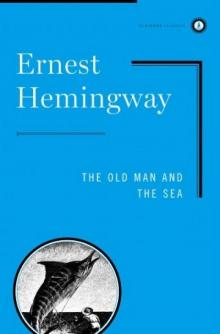 The Old Man and the Sea
The Old Man and the Sea Green Hills of Africa
Green Hills of Africa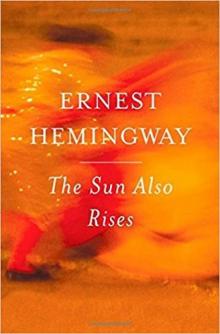 The Sun Also Rises
The Sun Also Rises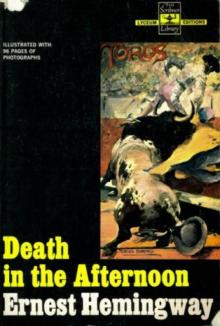 Death in the Afternoon
Death in the Afternoon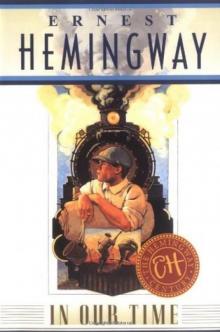 In Our Time
In Our Time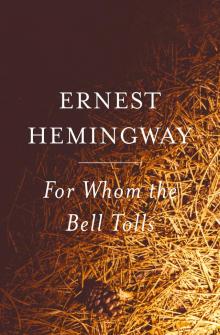 For Whom the Bell Tolls
For Whom the Bell Tolls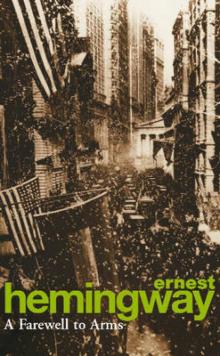 A Farewell to Arms
A Farewell to Arms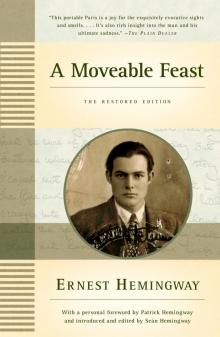 A Moveable Feast
A Moveable Feast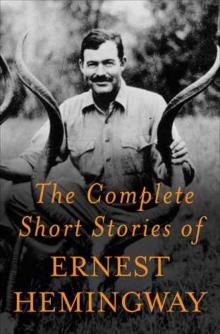 The Complete Short Stories of Ernest Hemingway
The Complete Short Stories of Ernest Hemingway Big Two-Hearted River
Big Two-Hearted River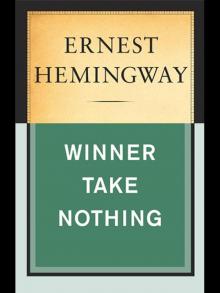 Winner Take Nothing
Winner Take Nothing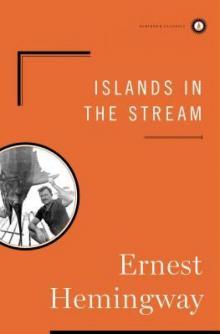 Islands in the Stream
Islands in the Stream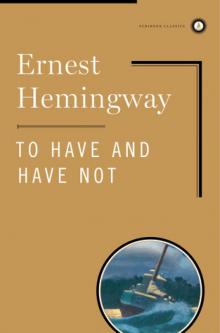 To Have and Have Not
To Have and Have Not The Snows of Kilimanjaro and Other Stories
The Snows of Kilimanjaro and Other Stories Across the River and Into the Trees
Across the River and Into the Trees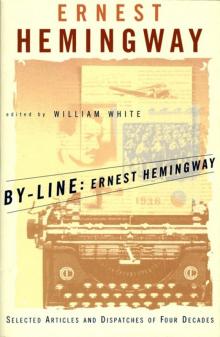 By-Line Ernest Hemingway
By-Line Ernest Hemingway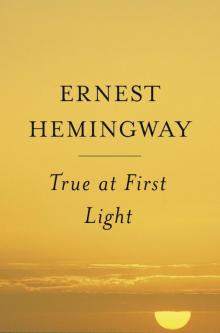 True at First Light
True at First Light Men Without Women
Men Without Women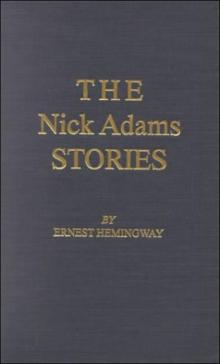 The Nick Adams Stories
The Nick Adams Stories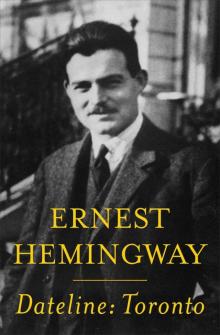 Dateline- Toronto
Dateline- Toronto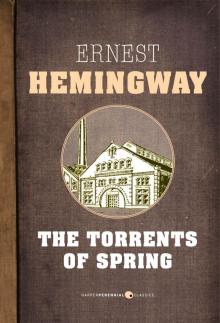 The Torrents of Spring
The Torrents of Spring Short Stories
Short Stories